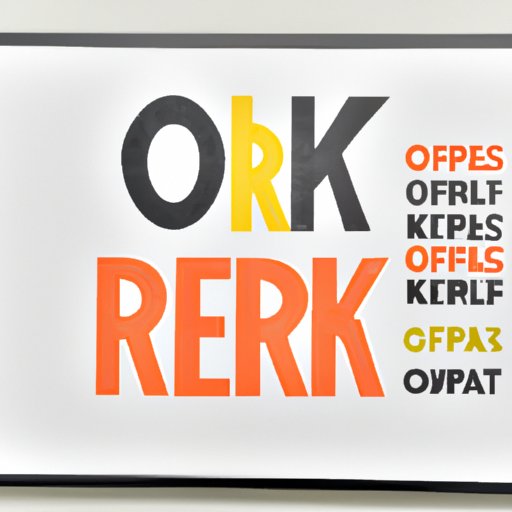
Introduction
Objectives and Key Results (OKRs) is a popular goal-setting methodology being used by many businesses to achieve their objectives. The OKR framework is simple to use yet effective in improving productivity, performance, and employee engagement. This article aims to provide a comprehensive guide on OKRs, why they are important, and how they can be used in businesses.
OKRs in Business: A Comprehensive Guide to Setting and Achieving Goals
OKRs are a collaborative goal-setting methodology used by businesses to align individual and team objectives to company-wide goals. This approach involves the process of setting measurable and achievable objectives that are ambitious yet attainable. Businesses that use OKRs find it useful in measuring progress, improving focus, and encouraging transparency throughout the company.
The benefits of using OKRs in goal-setting and tracking are numerous. Firstly, OKRs provide clarity on objectives and promote a sense of direction for employees. Secondly, they improve workplace agility and adaptability by ensuring that teams work on relevant and high-priority goals. Thirdly, OKRs help businesses stay aligned with their ultimate objectives and vision.
Real-life examples of successful companies using OKRs include Google, Intel, and LinkedIn. Google’s adoption of OKRs has resulted in increased transparency, focus, and alignment within its workforce. Similarly, LinkedIn uses OKRs to focus on long-term goals while still keeping track of weekly progress.
Maximizing Your Business Performance with OKRs
OKRs can improve business performance by promoting a strong sense of focus and accountability. Furthermore, OKRs facilitate communication and collaboration within teams, which enhances individual and team performance.
Tips on implementing and executing OKRs include first defining the company-wide objectives, breaking down the business objectives into team objectives, and then individual objectives. It is essential to ensure that the OKRs are set according to the SMART (Specific, Measurable, Achievable, Relevant, and Time-bound) principle. Regular check-ins and feedback sessions are also necessary to track progress and make adjustments to the OKRs where needed.
Real-world examples of businesses that have improved performance using OKRs include Salesforce, where the adoption of OKRs has resulted in increased performance and revenue growth. Similarly, Intel measures the success of its OKRs by tracking organizational alignment and employee engagement.
An Introduction to OKRs: The Tool That’s Revolutionizing Business
OKRs are a goal-setting methodology that originated in the 1980s and have since been popularized by businesses such as Google and Intel. John Doerr, the author of Measure What Matters, is one of the major players in the development of OKRs and has been instrumental in introducing them to various businesses.
The future of OKRs is bright, with more and more businesses adopting the methodology each year. OKRs may change in the future, becoming more data-driven and integrated into artificial intelligence and machine learning.
OKRs for Small Businesses: How to Set Smart Goals and Drive Success
Small businesses and entrepreneurs can also benefit from the OKR methodology by setting and tracking SMART goals. The benefits of utilizing OKRs include improved focus, better communication, and increased efficiency.
To set and track SMART goals using OKRs, businesses must first identify their company-wide objectives and then break them down into individual and team objectives. This process helps ensure that the OKRs are relevant and achievable. It is also necessary to monitor the progress regularly and make adjustments where needed.
Small businesses can tailor the OKR process to fit their unique needs by simplifying the objectives and communicating them effectively to employees.
The Importance of OKRs in Company Culture and Employee Engagement
OKRs play a significant role in enhancing company culture and employee engagement. By providing clear objectives, OKRs foster a sense of purpose among employees, which promotes motivation and engagement.
Strategies to communicate and align individual OKRs with company-wide goals include involving employees in the goal-setting process, providing regular feedback and recognition, and incorporating OKRs into the performance review process. Additionally, it is essential to ensure that OKRs are not used as a tool for micromanagement but instead, they are a medium for collaboration and growth.
Conclusion
OKRs are a simple yet effective goal-setting methodology that can help businesses improve their performance, focus, and employee engagement. By setting measurable objectives, businesses can enhance their agility and adaptability. Implementing and executing OKRs require careful planning, communication, and feedback. As evidenced by successful companies such as Google and LinkedIn, OKRs can revolutionize businesses, no matter the size.
Businesses that consider implementing OKRs in their goal-setting process must aim to align individual and team objectives with company-wide goals. This approach promotes accountability, focus, and collaboration — all necessary ingredients for success.





